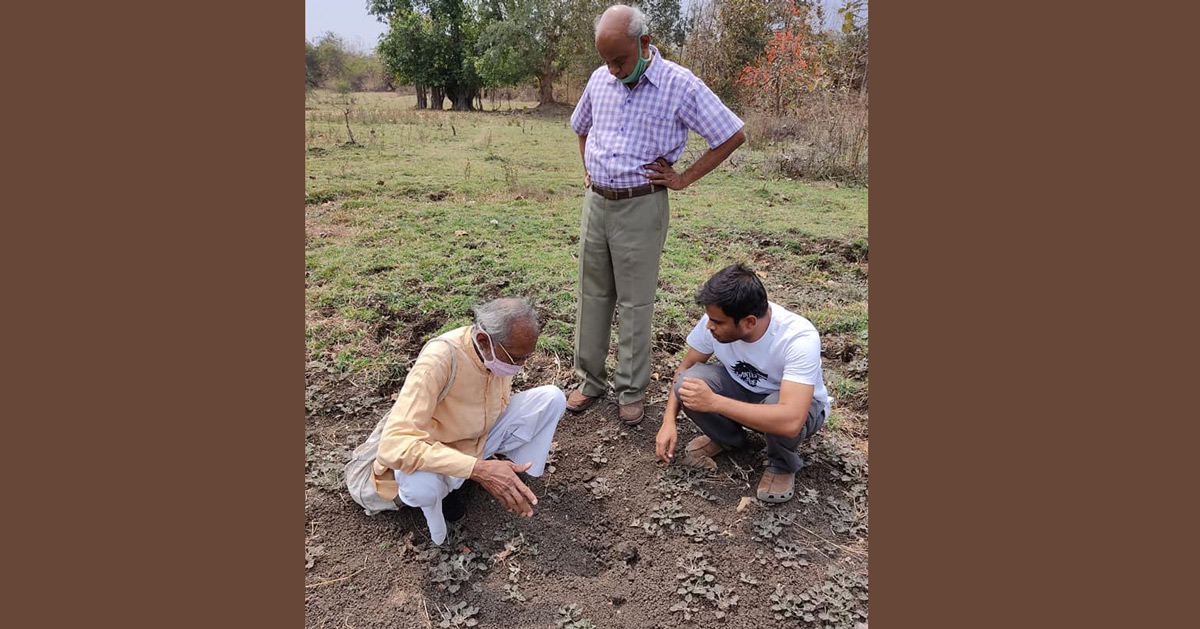
Indian agroecologist Akash Naoghare discusses how GM cotton has affected farmers and the path back to sustainability
Akash Naoghare comes from Nagpur, a city in Central India. He is currently studying for a master’s degree in food and development at the Institute of Development Studies, an independent research institute based at the University of Sussex, UK. Before coming to the UK, he worked with farmers in India to promote seed saving and agroecological practices. In an interview with GMWatch’s Claire Robinson, he recounts his first-hand experience of the effects of GM Bt cotton and GM herbicide-tolerant cotton on Indian farmers and culture – and points the way to a more sustainable future.
GMW: How did you come to study in the UK and what are your plans for the future?
AN: I have been working in agriculture and food systems for the last ten years. Since the very beginning, different forms of inequality and injustice have disturbed me a lot. I always had an urge to do something about it. However, with the kind of limited exposure I had, I didn’t have clarity regarding what I could do.
Back in 2013, my late mentor, Nanda Khare, introduced me to a new initiative called Beejotsav – an informal group of organic farmers, seed savers, activists and consumers that promotes seed freedom, chemical-free food and healthy biodiversity – and I volunteered for it.
It was Beejotsav that gave me much needed direction and fuelled my urge to do something meaningful instead of scattered efforts. After listening to farmers’ stories first hand and beginning to learn about the politics and economics of agricultural and food systems, I decided to work in this domain. My grassroots experience made me realise that farming is the root cause of many socio-economic issues in India, but even people from the development sector turn a blind eye to it.
 I had graduated as an engineer and worked in the steel industry for one and half years. To understand the economics behind farming distress and the spate of farmer suicides in the cotton-growing region of Vidarbha, I did a master’s in economics while working with Beejotsav. However, after working with different communities, organisations, and agencies, I felt I needed to upskill and get some formal education in the domain I was working in.
I had graduated as an engineer and worked in the steel industry for one and half years. To understand the economics behind farming distress and the spate of farmer suicides in the cotton-growing region of Vidarbha, I did a master’s in economics while working with Beejotsav. However, after working with different communities, organisations, and agencies, I felt I needed to upskill and get some formal education in the domain I was working in.
Although India is an agricultural state, it fails to give it sufficient attention and the same pattern is followed in higher education. After some research I found out that there is a master’s program called Food and Development at the high-ranking Institute of Development Studies (IDS) and I decided to pursue a master’s degree there. However, studying in the UK as an international student is expensive and I could not afford to do it. So I applied for scholarships and fortunately I was awarded the British Government’s Chevening Scholarship and a World Bank Scholarship. So I am doing a master’s here at IDS. After finishing my master’s I shall go back to Nagpur and continue my work with Beejotsav. I intend to work in the policy domain, to strengthen the agroecology movement in Central India.
GMW: Tell us about your work with farmers in India and your experience of GM Bt cotton.
AN: Since 2013, I have been part of Beejotsav. Beejotsav has been working with farmers who conserve indigenous seeds, to increase awareness and propagation. We have been also working with consumers to make them aware of safe food production and farmer distress. Beejotsav has influenced many people and farmers to take up organic farming and agroecological methods. We have been trying to influence policy through different approaches like lobbying, activism, and awareness raising. We also help farmers procure indigenous seed and manage soil and water. To date we have organised eight major seed festivals in Nagpur. with participation from 20 states of India and a few small village-level Beejotsavs in different parts of Vidarbha.
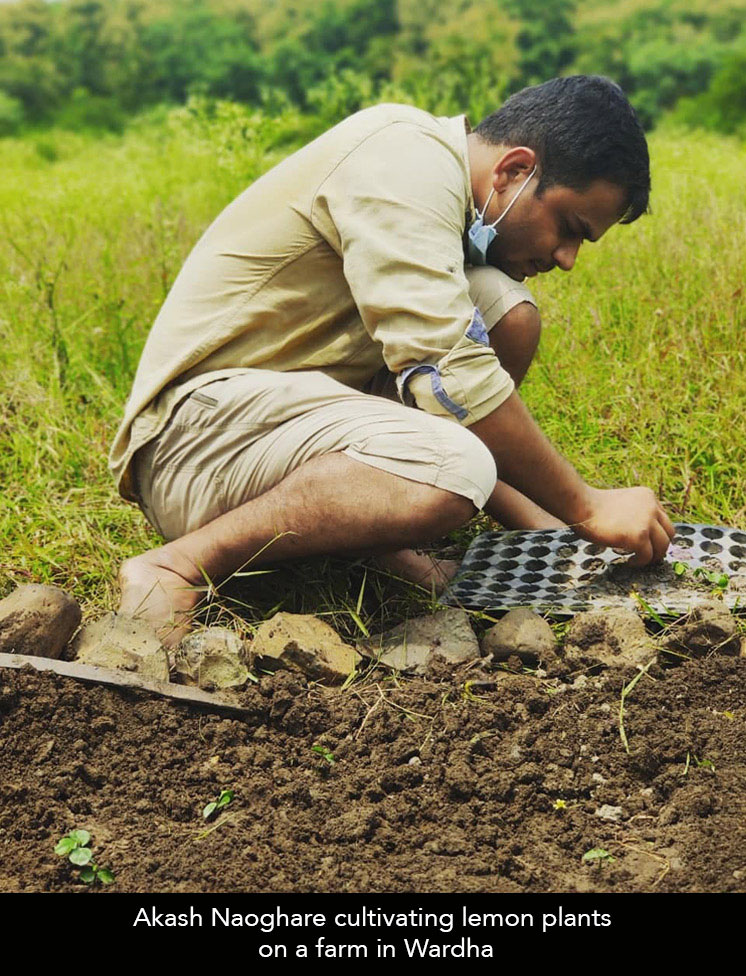 Beejotsav has also worked with government agencies like the Maharashtra State Rural Livelihood Mission (MSRLM) to train women farmers in decentralised bio-resource management.
Beejotsav has also worked with government agencies like the Maharashtra State Rural Livelihood Mission (MSRLM) to train women farmers in decentralised bio-resource management.
Our focus was never just on Bt cotton. Our approach is to make farmers aware of the alternatives to Bt cotton and how it has affected them negatively. We focus more on diversifying crops and the risk which comes along with the Bt cotton.
Bt cotton does give cash to farmers. However, with every day, the farmers are becoming more dependent on the market when it comes to their own food requirements, which was not the case earlier. So in the process, farmers are losing out on diversity and nutritious food and also multiplying their risk by cultivating Bt cotton as their main cash crop.
GMW: What are the negative aspects of Bt cotton cultivation?
AN: From the perspective of a person who works in the field, there are many negative aspects of Bt cotton cultivation.
Bt cotton was introduced as a pest-resistant variety against bollworm. Initially farmers did save some money due to reduced pesticide usage. However, with time, pests adapted to the toxins that Bt cotton generates and farmers had to spray more pesticides. Many farmers mixed different kind of pesticides and insecticides, as the prescribed ones were not doing the job. These mixtures led to farmer deaths. In Yavatmal, around 50 farmers were reported to have died due to pesticide poisoning. Many cases were not reported because they went to Wardha district for treatment.
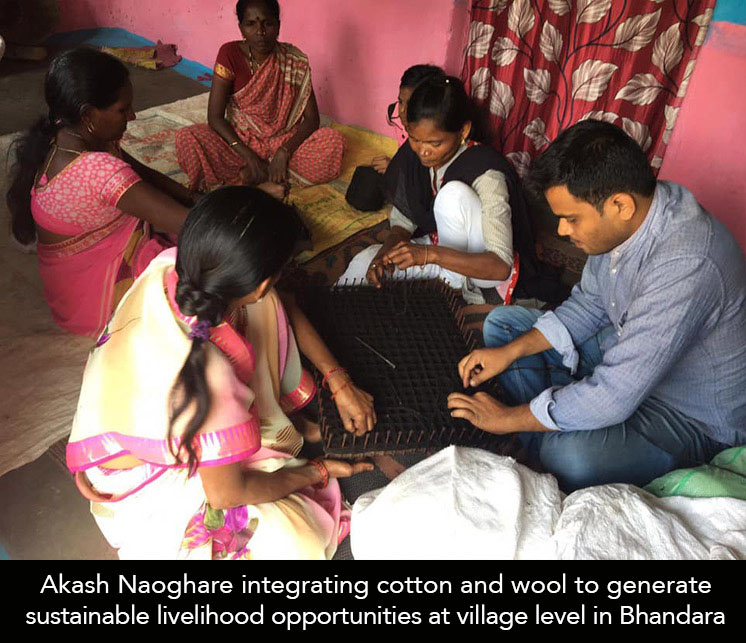 Buying more pesticides means farmers spend more money. Though they were producing more cotton, their net profits went down. The local economy and people’s livelihoods have been severely affected. The soil, air, and water on their farms were polluted and local biodiversity was damaged. Apart from that, before Bt cotton, cotton seeds were used locally to produce cotton seed oil and oil cake for cattle feed, but now this tradition is in decline because cattle have started showing different allergies when they eat Bt cotton oil cake.
Buying more pesticides means farmers spend more money. Though they were producing more cotton, their net profits went down. The local economy and people’s livelihoods have been severely affected. The soil, air, and water on their farms were polluted and local biodiversity was damaged. Apart from that, before Bt cotton, cotton seeds were used locally to produce cotton seed oil and oil cake for cattle feed, but now this tradition is in decline because cattle have started showing different allergies when they eat Bt cotton oil cake.
Lately, farmers who have been storing Bt cotton at their homes are suffering from a new type of skin allergy. Doctors have never seen this kind of allergy before and there is no prescribed medicine for it. People who suffer with this allergy are mostly farmers who have cultivated Bt cotton, farm labourers working in Bt cotton fields, and the people who work in the cotton supply chain – in other words, whoever comes in contact with Bt cotton). The allergy goes away as soon as you are no longer in contact with Bt cotton.
Bt cotton has also pushed indigenous cotton varieties and companion crops out of cultivation, which used to protect the food security of farmers. Now farmers have become dependent on the market for everything, and more money is going towards big corporations from small farmers.
GMW: Are there any positive aspects of Bt cotton cultivation?
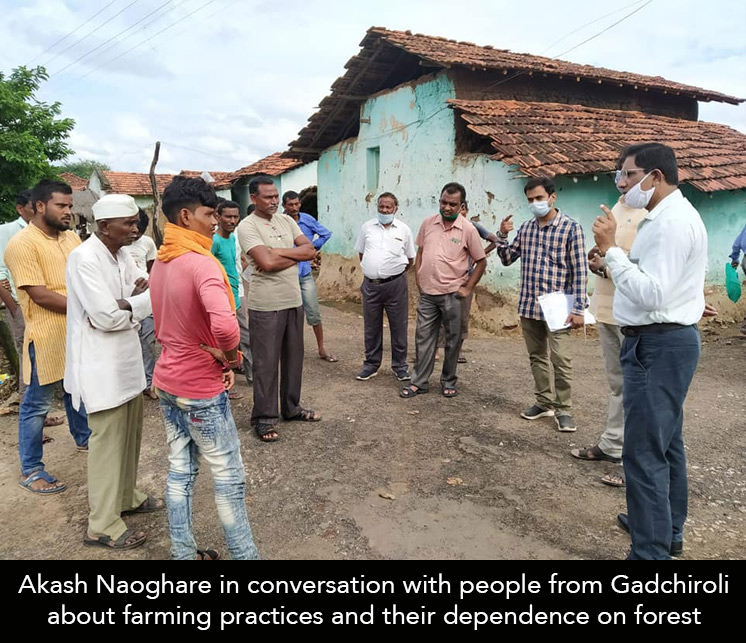 AN: Big farmers did make good money initially and it helped bring about the mechanisation of farms. However, in the long run it has had no positive effects at all. Everyone has suffered in one form or another.
AN: Big farmers did make good money initially and it helped bring about the mechanisation of farms. However, in the long run it has had no positive effects at all. Everyone has suffered in one form or another.
GMW: Why do so many cotton farmers (you mentioned around 98%) cultivate Bt cotton?
AN: First, seed companies have managed to convince farmers that new hybrid seeds and improved varieties perform better than indigenous varieties. Second, cotton being a cash crop, farmers tend to cultivate whatever offers them quick money (cotton, soy). Third, even if farmers wanted to cultivate indigenous cotton varieties, the market can’t guarantee its availability, so farmers do not take the risk. Fourth, there has been no support from the central or state governments to promote indigenous cotton. Fifth, when it comes to inputs, mechanisation and other things, the market helps Bt cotton. As a result of the combination of the above factors, more and more farmers tend to cultivate Bt cotton.
GMW: Tell us about your work promoting agroecology in India. Does it offer a real alternative to Bt cotton?
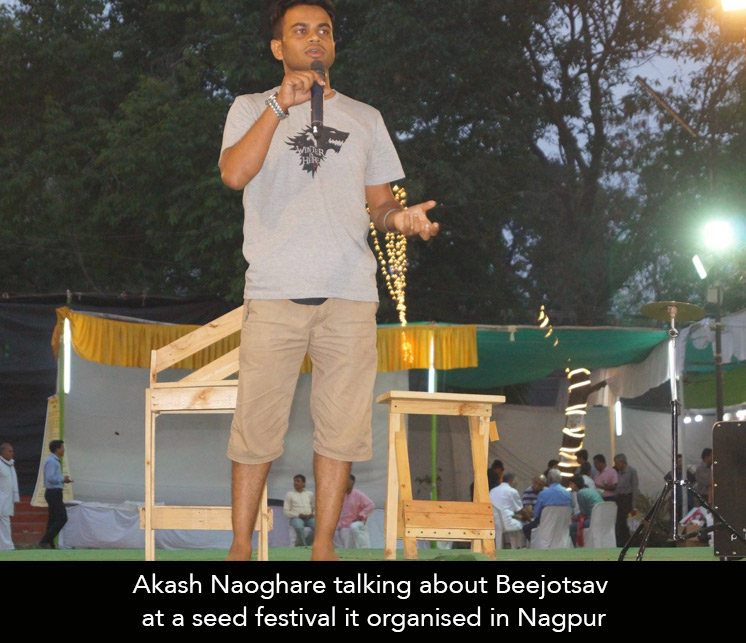 AN: As a response to Bt cotton failure and subsequently farmers committing suicide, we felt the need to promote a holistic approach to farming. So in Beejotsav we promote agroecological farming practices, taking local contexts into consideration. We have been advocating the use of local indigenous seeds through seed festivals, seed exchange programmes, awareness drives, capacity building of farmers, and many more initiatives. We have been working with government agencies to promote production of bio-resources in a decentralised manner at the village level, which can reduce the dependency on the market for agricultural inputs.
AN: As a response to Bt cotton failure and subsequently farmers committing suicide, we felt the need to promote a holistic approach to farming. So in Beejotsav we promote agroecological farming practices, taking local contexts into consideration. We have been advocating the use of local indigenous seeds through seed festivals, seed exchange programmes, awareness drives, capacity building of farmers, and many more initiatives. We have been working with government agencies to promote production of bio-resources in a decentralised manner at the village level, which can reduce the dependency on the market for agricultural inputs.
Agroecological practices in tandem with local diverse crops reduce the risk involved in monoculture of Bt cotton. They also improve farmers’ food and nutrition security. The local biodiversity remains intact, with no exploitation of natural resources, and the health hazards involved in the cultivation of Bt cotton are minimised. Holistically speaking, they are an alternative to Bt cotton.
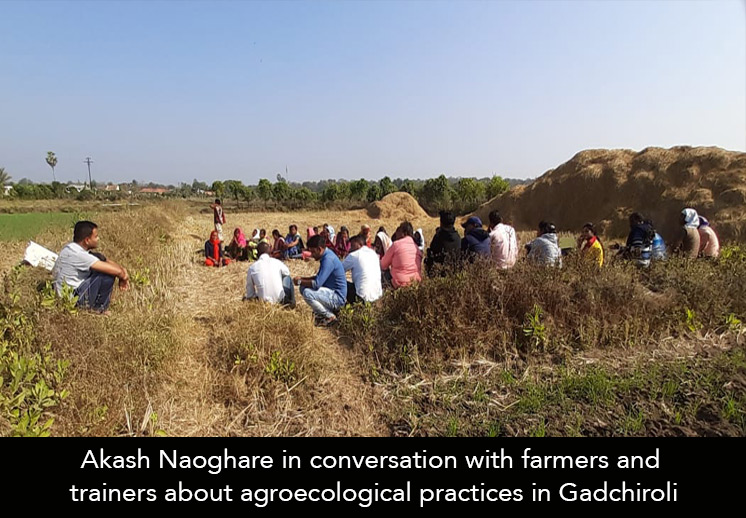 GMW: We understand there is a problem with illegally planted GM herbicide-tolerant cotton in India. Who is responsible and can you describe the extent of the problem?
GMW: We understand there is a problem with illegally planted GM herbicide-tolerant cotton in India. Who is responsible and can you describe the extent of the problem?
AN: A faction of the farmers’ movement has always supported GM technology. We know that the leaders of these movements were secretly meeting influential people from the development sector, politics, and seed or allied companies, in order to promote their own agenda. The farmers’ leaders were given foreign trips sponsored by the companies, to influence them. In the same fashion, several studies were conducted to help promote GM technology in India, which were funded by big allied corporations.
The same people and movements have been trying to make inroads in the Indian market for GM herbicide-tolerant cotton for the last 4–5 years. However, they didn’t garner enough momentum to succeed. But then in 2020, COVID happened and they grabbed this opportunity with both hands. When the whole system was busy tackling the pandemic, people from this movement smuggled in GM herbicide-tolerant cotton and Bt brinjal [eggplant/aubergine] via Bangladesh and cultivated them in many parts of central Vidarbha. Since not many farmers understand the technology of GM seeds, people from the farmers’ movement with the help of influential people from the villages ask or pressurise the farmers to cultivate herbicide-tolerant cotton. These seeds are illegal, so if they fail, farmers cannot report the failure to anyone. This has happened to many farmers. Many people made profit selling illegal seeds which wouldn’t germinate, which impacted farmers for an entire season.
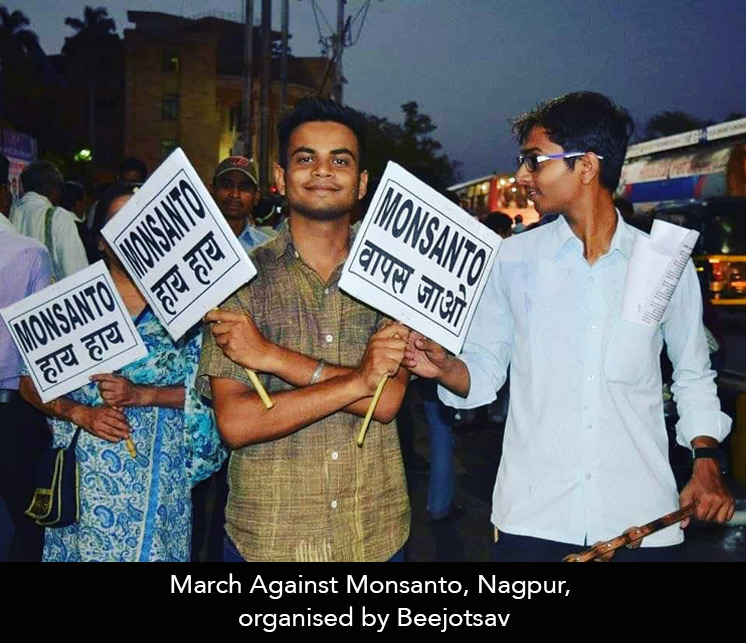 I believe we have crossed the tipping point when it comes to cotton – and herbicide-tolerant cotton will follow the same path as Bt cotton in India. Unless and until the government acts strongly against it, the problems of GM herbicide-tolerant cotton and Bt brinjal will persist.
I believe we have crossed the tipping point when it comes to cotton – and herbicide-tolerant cotton will follow the same path as Bt cotton in India. Unless and until the government acts strongly against it, the problems of GM herbicide-tolerant cotton and Bt brinjal will persist.
GMW: What is needed for India to transition to a more sustainable agriculture?
AN: India needs to follow agroecological practices, taking local context into consideration. With India being an agrarian and diverse country with 15 agroclimatic zones, our farmers are well equipped with traditional knowledge and practices. The state should study these traditional practices and promote the best ones. Single-solution-oriented approaches like GM Bt cotton or soybean can’t help diverse countries like India. India needs to invest in community-inclusive models, where both local knowledge and the scientific approach will be the key.
Main image: Akash Naoghare in conversation with Vasant Futane and Dr Trak Kate regarding soil health in Wardha, India